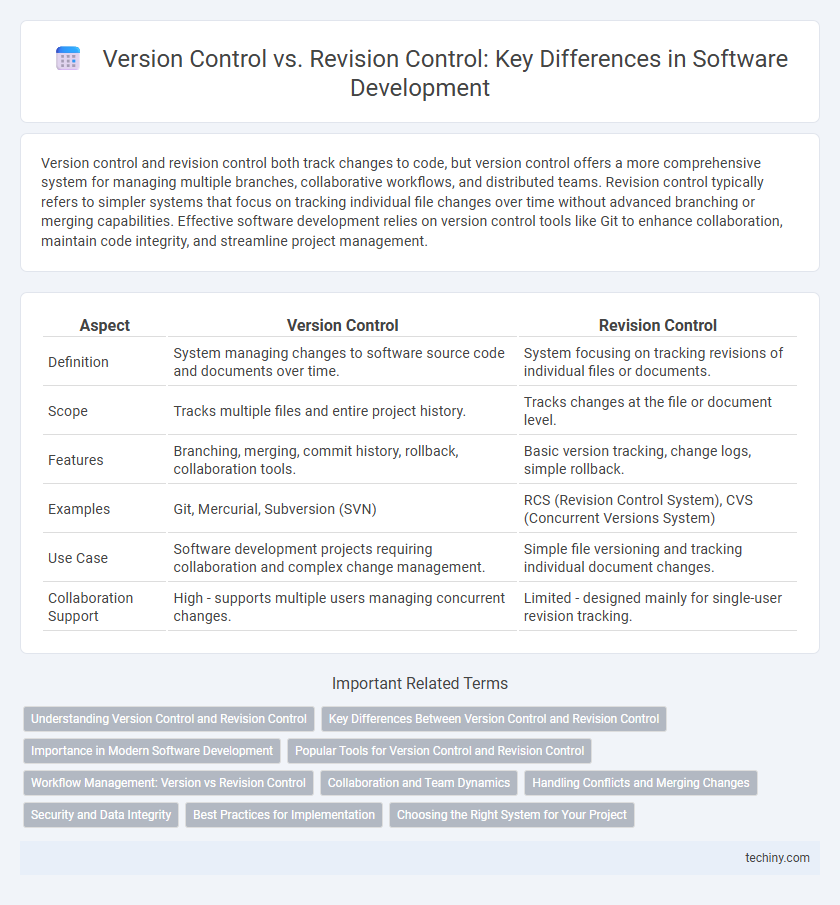Version control and revision control both track changes to code, but version control offers a more comprehensive system for managing multiple branches, collaborative workflows, and distributed teams. Revision control typically refers to simpler systems that focus on tracking individual file changes over time without advanced branching or merging capabilities. Effective software development relies on version control tools like Git to enhance collaboration, maintain code integrity, and streamline project management.
Table of Comparison
| Aspect | Version Control | Revision Control |
|---|---|---|
| Definition | System managing changes to software source code and documents over time. | System focusing on tracking revisions of individual files or documents. |
| Scope | Tracks multiple files and entire project history. | Tracks changes at the file or document level. |
| Features | Branching, merging, commit history, rollback, collaboration tools. | Basic version tracking, change logs, simple rollback. |
| Examples | Git, Mercurial, Subversion (SVN) | RCS (Revision Control System), CVS (Concurrent Versions System) |
| Use Case | Software development projects requiring collaboration and complex change management. | Simple file versioning and tracking individual document changes. |
| Collaboration Support | High - supports multiple users managing concurrent changes. | Limited - designed mainly for single-user revision tracking. |
Understanding Version Control and Revision Control
Version control manages changes to software code by recording multiple versions, enabling developers to track progress and collaborate effectively. Revision control, often considered a subset of version control, focuses specifically on tracking individual changes and iterations within files to maintain integrity and history. Both systems are essential for software development workflows, improving code quality and facilitating error recovery.
Key Differences Between Version Control and Revision Control
Version control focuses on managing changes to source code over time by tracking versions, enabling collaboration and maintaining a history of changes, while revision control typically refers to tracking individual changes or revisions within a specific version. Version control systems like Git store complete snapshots of the project, supporting branching and merging, whereas revision control often centers on incremental changes or patches to files. Key differences include the scope of control--version control offers a broader project-level management, whereas revision control deals primarily with individual file modifications.
Importance in Modern Software Development
Version control systems (VCS) like Git enable developers to track code changes, collaborate efficiently, and manage multiple development branches simultaneously, which is critical for maintaining code integrity in modern software projects. Revision control focuses on managing incremental updates and historical record-keeping, ensuring that every modification is documented and reversible. The integration of version control with continuous integration and deployment tools enhances project scalability, reduces conflicts, and increases overall software quality.
Popular Tools for Version Control and Revision Control
Git and Subversion (SVN) are the most popular version control tools, widely used for tracking changes in source code across software development projects. Mercurial, known for its distributed version control capabilities, and CVS, an older system focused on revision control, are also significant in maintaining historical code versions. These tools facilitate collaborative development by managing code revisions, branching, and merging efficiently.
Workflow Management: Version vs Revision Control
Version control systems manage entire software development workflows by tracking changes across multiple branches, enabling collaboration and parallel development. Revision control focuses on individual file changes, preserving previous versions but with limited support for complex branching and integration. Effective workflow management in software development increasingly relies on version control to handle codebase evolution and coordination among distributed teams.
Collaboration and Team Dynamics
Version control systems facilitate seamless collaboration by tracking changes from multiple contributors in real-time, enabling teams to merge updates efficiently and resolve conflicts with minimal disruption. Revision control, a subset of version control, historically emphasized linear tracking of file modifications, often limiting concurrent teamwork capabilities. Modern version control enhances team dynamics by supporting branching and integrating diverse workflows, fostering a more flexible and collaborative development environment.
Handling Conflicts and Merging Changes
Version control systems manage concurrent changes from multiple developers by tracking and merging modifications while preserving project history. Conflict handling involves identifying code discrepancies during simultaneous edits, offering tools to manually or automatically resolve differences. Effective merging strategies ensure seamless integration of revisions, minimizing errors and maintaining codebase integrity.
Security and Data Integrity
Version control systems enhance security by implementing robust access controls, authentication, and encryption, ensuring only authorized users can modify code. Revision control emphasizes data integrity by tracking individual changes, maintaining comprehensive audit trails, and enabling rollback to previous stable states in case of errors or malicious alterations. Both systems employ cryptographic hashing to verify the integrity of stored code snapshots, preventing unauthorized tampering and preserving the authenticity of the software history.
Best Practices for Implementation
Implementing version control systems like Git or Mercurial ensures efficient collaboration and traceability by managing code changes across multiple contributors. Best practices include establishing clear branching strategies, enforcing commit message guidelines, and integrating automated testing with continuous integration pipelines. Regularly reviewing and merging changes reduces conflicts, while backup routines guarantee data integrity and facilitate rollback when necessary.
Choosing the Right System for Your Project
Choosing the right system for your project requires understanding that version control manages changes across multiple files and branches, while revision control focuses on tracking changes within individual files. Modern version control systems like Git provide distributed repositories and support collaborative workflows, making them ideal for complex software development projects. Evaluating factors such as team size, project complexity, and collaboration needs ensures optimal selection between version control and revision control tools.
Version Control vs Revision Control Infographic

 techiny.com
techiny.com